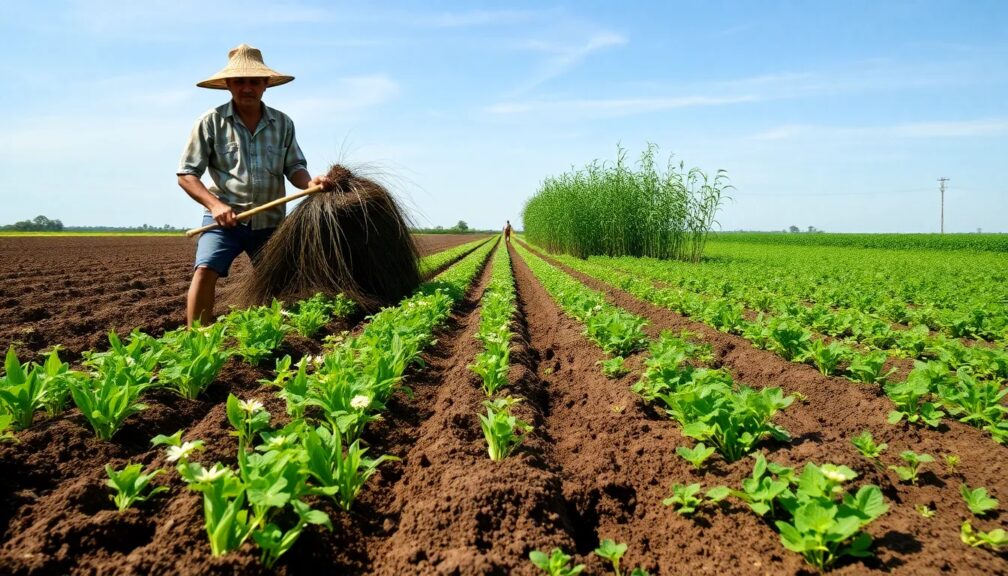Does tilling cause more weeds

Exploring the Impact of Tilling on Weed Proliferation
Tilling is a traditional farming practice that has been used for centuries to prepare soil for planting. It involves turning over the top layer of soil, which can help in controlling weeds, aerating the soil, and incorporating organic matter. However, there is a growing debate among gardeners and farmers about whether tilling does more harm than good, particularly when it comes to the issue of weeds. Some argue that tilling can disrupt the soil ecosystem and bring dormant weed seeds to the surface, potentially leading to a greater weed infestation. This article delves into the science behind tilling and its effects on weed growth, providing insights into the best practices for maintaining a healthy and productive garden or farm. Join us as we uncover the complex relationship between tilling and weeds.
What are the negative effects of tilling?
Unveiling the dark side of an age-old agricultural practice, the impacts of tilling are profound and far-reaching. Imagine the very foundation of our food system shaken, where the hidden costs of a seemingly benign activity like tilling can no longer be ignored.
Firstly, the destruction of soil structure is a silent crisis beneath our feet. Tilling breaks apart the intricate network of soil particles, leaving the land vulnerable to erosion. The reality is stark – precious topsoil that took centuries to form can be blown or washed away in just a few seasons.
The problem intensifies with the loss of organic matter. This is not just about depleting nutrients; it's a cascade effect where the soil's ability to hold water and support life diminishes. The very organisms that are the cornerstone of soil fertility are put at risk, turning fertile land into lifeless dirt.
Moreover, we cannot overlook the carbon footprint of tilling. It releases significant amounts of carbon dioxide into the atmosphere, exacerbating the climate crisis. This is the untold story of how traditional farming methods are contributing to our global environmental emergency.
But the consequences don't end at the environmental level. The ripple effects extend to the economic realm, affecting farm productivity and profitability. When soil health declines, so does the yield. The irony is palpable – in trying to boost crop production, tilling can ultimately lead to its downfall.
You might be wondering, if the effects are so detrimental, why is tilling still widespread? The truth lies in tradition, convenience, and short-term gains. Yet, there is a growing movement towards sustainable alternatives. The question is, will we adapt in time to save our soils, or will we continue down the path of degradation?
The negative effects of tilling highlight a critical crossroads for agriculture and environmental stewardship. Stay tuned to grasp the full picture and explore the practices that could turn the tide for our endangered soils. The future of our food and planet hinges on the choices we make today.
How to keep weeds from growing after tilling?
Have you ever spent hours tilling your garden, only to find it overrun with weeds just a few weeks later? It's a common frustration among gardeners, but what if I told you there are effective strategies to prevent these pesky plants from taking over your precious soil? Yes, wave goodbye to endless weeding sessions and discover the secrets to maintaining a pristine garden bed.
Pre-emergent Herbicides – These are the unseen shields of your garden. Applied correctly, pre-emergent herbicides form a barrier that stops weed seeds from ever sprouting. Imagine having the power to stop weeds before they even begin!
Mulching – The garden guardian. A thick layer of mulch is not just about aesthetics; it smothers emerging weeds and retains soil moisture. Organic options like straw or wood chips add nutrients back into the soil as they decompose, doing double duty for your garden's health.
Cover Crops – These are the unsung heroes in the fight against weeds. Planting cover crops, such as clover or rye, can outcompete weeds for resources and space, acting as living mulch. Plus, they offer the added benefit of enriching the soil once they're turned under.
Soil Solarization – Harness the sun's power to create an inhospitable environment for weed seeds. By covering your soil with clear plastic, you can elevate temperatures to levels that destroy weeds and their seeds. It's like turning your garden bed into a sauna for weeds, but the heat is too much for them to handle!
Drip Irrigation – Control water distribution with precision. Drip irrigation sends water directly to your plants, depriving weeds of the moisture they crave. It's a simple change that can have a huge impact on your garden's weed population.
Excited to dive into these methods and reclaim your garden from the clutches of weeds? Stay tuned, because we're about to explore each technique in detail, giving you the tools to transform your garden into the envy of the neighborhood. Say hello to lush, vibrant plants, and farewell to the unwelcome green invaders! It's time to take control and enjoy the fruits (or vegetables) of your labor, weed-free.
Should you kill weeds before or after tilling?
Gardeners and farmers alike are often faced with the tenacious challenge of dealing with weeds. These unwelcome plants can be formidable foes, competing for nutrients, water, and sunlight with the crops you painstakingly nurture. The question then arises: when is the optimal moment to launch your assault on these invaders? Should you strike before thrusting your tiller into the soil, or is it more effective to wait until after the earth has been turned?
The answer lies in understanding the life cycle of weeds and the impact of tilling on both the weeds and the soil ecosystem. Firstly, it's crucial to recognize that tilling can bring dormant weed seeds to the surface, potentially leading to a fresh wave of weed problems. By addressing the weed issue prior to tilling, you could potentially reduce the emergence of new weed growth.
However, if you're dealing with perennial weeds, those with deep root systems, or invasive species that can propagate from root and stem segments, tilling after weed removal might be the secret to ensuring these resilient plants don't make a comeback. It's a strategic move that can save you hours of future labor.
Imagine stepping into your garden, where the fruits of your labor should be the star of the show, only to find it has been taken over by a sea of weeds. It's a sight that could discourage even the most dedicated green thumb. But fear not, because knowing the timing and techniques to effectively combat weeds can turn the tides in your favor.
Stay tuned for the ultimate guide on how to declare war on weeds – understanding the nuances of pre-tillage weed management versus post-tillage weed control will be your game-changing strategy. The war on weeds is winnable, and with the right knowledge, your garden will thrive, free from the tyranny of these unwelcome invaders.
Does tillage reduce weeds?
Unlock the secrets of a garden that defies expectations, where every inch of soil is a battleground in the timeless war against unwanted invaders. Farmers and gardeners alike whisper of an age-old technique that might just be the key to reclaiming dominion over their precious land. But is this method the panacea it promises to be, or does it harbor hidden consequences that could leave the earth thirsting for a gentler touch? Dive into the mystery, as we unearth the truth behind this pivotal question.
The art of tillage has been passed down through generations, a testament to its enduring presence in agriculture. By turning, stirring, and flipping the soil, one initiates a cascade of effects that are as profound as they are controversial. The immediate result is often clear; a barren field, seemingly cleansed of the green intruders. But what lurks beneath the surface? Are we sowing the seeds of success, or cultivating a deeper problem?
Evidence suggests that tillage, when executed with precision, can drastically cut down the population of weeds. These pests, thriving in the undisturbed sanctuary of the soil, are brought into the harsh light of day, their lifelines severed as the plow moves through the earth. But let's not be too hasty to draw conclusions, for the story doesn't end there.
Imagine a world where each pass of the plow awakens dormant weed seeds, lying in wait for their moment to rise. Consider the possibility that we might be playing into their strategy, a plan millennia in the making. As the blade turns the soil, it also ushers in the potential for a fresh wave of invaders, each seedling more determined than the last.
The plot thickens when we introduce the concept of soil health. The very act of tillage can disrupt the delicate ecosystem underground, leading to erosion, loss of nutrients, and a breakdown in the symbiotic relationships that keep our soils vibrant and alive. So, we find ourselves at a crossroads, weighing the allure of immediate results against the long-term vitality of our land.
In the quest for a garden of Eden, where whispers of a weed-free utopia tantalize the senses, the choice is yours. Will you wield the plow and enter the fray, or search for harmony with nature's intricate web? Stay with us as we delve deeper into the saga of soil and survival, where choices are complex and the future of our food hangs in the balance. The full revelation awaits those brave enough to look beyond the furrows and into the very heart of the earth.
Does tilling cause more weeds reddit
If you've ever found yourself caught in the endless cycle of weeding your garden, you might have stumbled upon a hotly debated topic in the gardening community. The question of whether tilling your soil is a ticket to an effortless weed-free paradise or an open invitation for even more weeds has sparked countless discussions across forums, with a particularly intense debate raging on Reddit.
Gardeners around the world are turning to this platform to share their personal experiences and scientific findings on the matter. Some argue that tilling disrupts the soil ecosystem, bringing dormant weed seeds to the surface and giving them the sunlight they crave to germinate. Others counter that, if done correctly, tilling can actually help control weeds by disrupting their growth cycle.
Picture this: It's a bright, sunny day, and you're standing in the midst of your thriving garden, but instead of admiring the fruits of your labor, you're locked in mortal combat with an army of relentless weeds. Now imagine stumbling upon a discussion that might hold the key to tipping the scales in your favor. That's exactly what you'll find when delving into the Reddit archives.
Here's a snippet of what you might uncover:
1. Experiences with no-till gardening versus traditional tilling methods.
2. In-depth analyses of how tilling affects soil health and weed seed germination.
3. Alternative weed management strategies, such as mulching or using cover crops.
Each thread is packed with anecdotes and sometimes even heated debate, but one thing is clear: there is no one-size-fits-all answer. What works for one gardener's soil type and climate may not work for another's. However, the collective wisdom of this community can provide invaluable insights that just might be the game-changer your garden needs.
So, are you ready to join the ranks of those in the know? Are you prepared to sift through the soil of knowledge to unearth the truth about tilling and weeds? Dive into the conversation and discover the secrets that could transform your gardening experience. The answer to the ultimate weed dilemma is just a few clicks away, and the green-thumbed citizens of Reddit are eager to welcome you into the fold. Don't let the mystery linger any longer; the path to a lush, weed-minimized garden awaits!
Consejo final: If you're concerned about tilling causing more weeds, it's essential to weigh the pros and cons. Tilling can indeed disturb dormant weed seeds and bring them to the surface, potentially leading to more weeds. To minimize this, consider reduced tillage or no-till gardening practices, which can help maintain soil structure and reduce the weed seed bank. Always plan your garden management carefully to keep weed growth under control.
Wishing you a fruitful gardening journey with minimal weed troubles.
 Do I need to remove weeds before tilling
Do I need to remove weeds before tilling What is better a tiller or cultivator
What is better a tiller or cultivator Can you plant vegetables without tilling
Can you plant vegetables without tilling Will a tiller break up hard soil
Will a tiller break up hard soil How do you till soil without a tiller
How do you till soil without a tillerIf you want to know more about similar articles like Does tilling cause more weeds you can visit category Gardening Tools.
Deja una respuesta